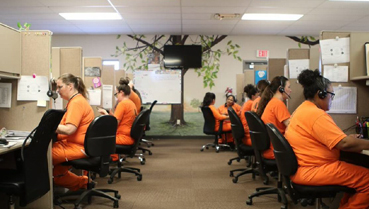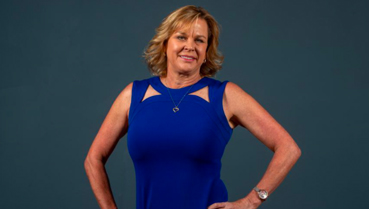Could a call center inside Homestead prison help female inmates?
Could a call center inside Homestead prison help female inmates get back on track?
Originally published by the Miami Herald on March 4, 2021
by Yadira Lopez
Brooke Shafer walked into prison as a former social worker and walked out as a marketer.
The Arizona company that helped Shafer shift careers while serving time is now setting up shop at Homestead Correctional Institution. Televerde, a Phoenix-based company that puts incarcerated women to work as sales, marketing and customer service representatives for corporate clients, is hiring inside the Homestead facility.
Televerde plans to add about 150 paid, full-time positions for inmates inside the facility in the next 12 to 18 months. The mixed security prison houses about 600 women. While the facility offers various unpaid jobs and training programs, according to the Department of Corrections there are currently only 44 paid positions.
Homestead will be Televerde’s eighth U.S. call center staffed by prisoners and its first foray into Florida. Founded in 1994, the company already has call centers inside Arizona and Indiana prisons.
Televerde would not disclose how much the women in their call centers earn. The company pays the Department of Corrections, which then deducts money for restitution fees and other fines. A portion of the money is given to the women for use during incarceration while another portion is put into a savings account they can access after release.
Televerde said its pay rates vary by state and are compliant with minimum wage laws and tenure with the company.
The vast majority of inmates in Florida do not get paid for work they perform. A share of paid positions exist via PRIDE Enterprises, an organization created by the Florida legislature to operate prison training programs in the state. Inmates in paid positions in the state’s prisons typically earn between 25 and 90 cents per hour. Televerde is partnering with PRIDE to offer the new positions.
“Two of the biggest problems with incarcerated people is they come out of prison and they have no skills. The other is they have no money,” said Morag Lucey, Televerde’s chief executive officer. “Our whole purpose is to train ladies while they’re incarcerated and give them skills in sales, marketing and technology so that when they’re released, they have the skills and acumen they need to reenter society successfully and not re-offend.”
Women staffing Televerde’s prison call centers work 40 hours a week in an office setting the company creates inside each facility. They’re trained and supervised by outside staff. To the naked eye, Lucey said, the setup is no different from a corporate environment.
Interested applicants go through an interview process. Candidates must have a high school diploma or GED and at least 18 months left on their prison sentence.
“When we do it right, the state makes money, the women working for us make money, our company makes money and our clients make money,” said Vince Barsolo, Televerde’s chief strategy and growth officer.
Using Televerde’s services has allowed Micro Focus, a multinational software company, to reach more people more efficiently, said Phil Rayment, Micro Focus vice president for channel and mid-market sales for North America. The company has seen significant return on investment from Televerde’s reach and skillset.
“Televerde has the people, infrastructure and experience in outbound customer outreach – it’s all they do. As a vendor we simply don’t have the same level of fully dedicated staff and infrastructure to do the same ourselves,” Rayment said.
For the prison communications firm Securus Technologies, partnering with Televerde was a meeting of like minds. Securus, which provides phone and video calling services to inmates, has been undergoing a corporate shift that gives greater weight to anti-recidivism efforts, according to Joanna Acocella, vice president of corporate affairs.
“The empathy levels of the women answering the calls are off the charts,” Acocella said. The company started with 45 Televerde agents and is now up to 75, with the intention to expand. Rather than outsource or offer the services in-house, the company chose to partner with Televerde due to their “shared values,” she added.
“We’re not saving money by using Televerde,” Acocella said. “The costs look relatively similar between different models. But what we’re getting is improved stats, happier customers and value for the money we’re spending.”
That same sense of shared values is what drew PRIDE to Televerde, said Dee Kiminki, chief administrative officer of PRIDE Enterprises.
“When we learned of each other we realized this was a great opportunity because we have similar goals,” Kiminki said. Kiminki said for many inmates, training programs inside the prison are the first job they’ve ever had. When Televerde founder Ron Bell volunteered in a prison ministries program in the 90s he noticed the untapped potential of female inmates, Barsolo recounts. At the time, most prison jobs were in agriculture and construction and were geared mostly toward men.
The company received early support from IBM and Microsoft. Other corporate clients include Epson and Interstate Batteries. “It’s important when you look at a program like this to understand the socioeconomic benefit,” said Lucey. “So many people come at it as ‘You’re using prison labor.’ It would behoove us to not use prison labor and instead work with people that already have the skills and we wouldn’t have to invest as much as we do into this.”
A 2019 study conducted by Arizona State University’s Seidman Research Institute backs up Lucey’s argument. Researchers looked at Televerde participants from 2011 to 2018. They found 94.1% of Televerde graduates are in paid employment approximately five years after release compared to the national average of 49.8% for formerly incarcerated women.
The recidivism rate of Televerde graduates is 91% lower than the Bureau of Justice Statistics’ national rate among females released from state prisons, according to the research.
The benefits, according to the researchers, extend to families. Dependent children of Televerde graduates were less likely to drop out of school or be incarcerated themselves.
Televerde’s foundation offers wraparound services and hiring programs that have allowed women like Shafer to jump into full-time employment almost immediately upon their release.
For Shafer, the savings account and the certifications she received through Televerde while in prison provided the structure for life after her December release, after five years as a Televerde employee at an Arizona prison, she said. Without it, “I’m sure I would be struggling. [The job] helped me save enough to start my life, live comfortably, get a car and clothes. I’ve had to start all over.”
Televerde jobs were highly coveted at the facility, said Shafer, who worked her way through sales and data roles. Most of the women in her unit worked in farming jobs, so Televerde job postings created a buzz. A handful of positions typically attracted more than 100 applicants.
“You have typical prison jobs – kitchen, cleaning – but there’s not a whole lot of options so Televerde definitely stood out,” Shafer said. “Here was a job I could do that paid decent and that allowed me to learn a marketable skill.”
The job gave her confidence, she said. The interview process, the humdrum cubicle setting and lunch breaks all created a sense of normalcy. The women who staffed the call center were often sought out by other inmates for help with resumes and interview tips, said Shafer.
And that, said Lucey, is the point.
“We look at these women with a future lens,” Lucey said. “What could they be when they leave prison, how will they re-enter society and what skills will they have.”


